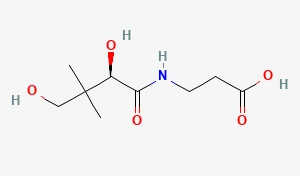
Pantothenic acid, also known as vitamin B5, is a remarkable nutrient that plays a crucial role in maintaining overall health and enhancing fitness performance. This essential vitamin is a key player in numerous bodily functions, making it an invaluable component of a well-rounded approach to wellness and physical fitness.
From a fitness perspective, pantothenic acid shines as a vital contributor to energy metabolism. As an integral part of coenzyme A (CoA), it helps convert the food we eat into usable energy. This process is fundamental for athletes and fitness enthusiasts who require a constant supply of energy to fuel their workouts and recovery. By supporting the breakdown of carbohydrates, fats, and proteins, pantothenic acid ensures that our bodies can efficiently utilize these macronutrients for energy production.
The role of pantothenic acid in energy metabolism extends beyond just providing fuel for physical activities. It also plays a part in the synthesis and metabolism of fatty acids, which is crucial for those looking to optimize their body composition. Whether the goal is to build lean muscle mass or reduce body fat, having efficient fatty acid metabolism can contribute significantly to achieving these fitness objectives.
Cardiovascular health is another area where pantothenic acid shows promise. Some studies suggest that it may help in managing cholesterol levels, potentially contributing to a healthier lipid profile. This aspect is particularly relevant for fitness enthusiasts who are not only concerned with their physical performance but also with their long-term heart health. By potentially supporting healthy cholesterol levels, pantothenic acid aligns well with a holistic approach to fitness that considers both immediate performance and long-term well-being.
For those engaged in intense training regimens, the potential anti-inflammatory properties of pantothenic acid are worth noting. While exercise is beneficial, it can also lead to inflammation in the body, especially after strenuous workouts. Pantothenic acid’s role in potentially mitigating inflammation could be valuable for athletes looking to optimize their recovery and reduce downtime between training sessions.
Skin health is another area where pantothenic acid shines, which is particularly relevant for those who spend a lot of time outdoors or in harsh gym environments. Its ability to support skin barrier function and potentially aid in wound healing can be beneficial for athletes who may experience skin irritations or minor injuries during their training. Healthy skin is not just about aesthetics; it’s an important aspect of overall health and can contribute to a more comfortable and effective workout experience.
The potential of pantothenic acid to support adrenal function is another aspect that fitness enthusiasts should consider. The adrenal glands play a crucial role in producing hormones that help manage stress, including the physical stress of intense workouts. By potentially supporting adrenal function, pantothenic acid may help in maintaining hormonal balance, which is crucial for optimal performance and recovery.
From a nutritional standpoint, pantothenic acid is widely available in many foods, making it relatively easy to incorporate into a balanced diet. Foods rich in this vitamin include beef, chicken, eggs, and various vegetables. For those following specific dietary regimens, such as vegetarian or vegan diets, there are plenty of plant-based sources of pantothenic acid as well. This accessibility makes it a convenient nutrient to focus on for those looking to optimize their diet for fitness and health.
While pantothenic acid supplementation has been explored in various contexts, it’s important to note that a balanced diet is often sufficient to meet the body’s needs. However, for athletes or individuals with increased energy demands, consulting with a healthcare professional about potential supplementation could be beneficial. The safety profile of pantothenic acid is generally favorable, with minimal side effects reported even at higher doses, making it a low-risk option for those considering supplementation.
The versatility of pantothenic acid in supporting various bodily functions makes it an exciting nutrient in the world of fitness and health. Its role in energy production, fatty acid metabolism, and potential benefits for cardiovascular health align well with the goals of many fitness enthusiasts. Moreover, its potential to support skin health and adrenal function adds to its appeal as a comprehensive wellness nutrient.
Looking to the future, ongoing research into pantothenic acid may uncover even more benefits relevant to fitness and health. As our understanding of nutritional science evolves, we may discover new ways in which this vitamin can support athletic performance, recovery, and overall well-being.
In conclusion, pantothenic acid stands out as a valuable ally in the pursuit of fitness and health goals. Its multifaceted role in energy metabolism, potential cardiovascular benefits, and support for skin health make it a nutrient worth considering for anyone serious about their physical well-being. By embracing a diet rich in pantothenic acid and other essential nutrients, individuals can lay a strong foundation for their fitness journey. As we continue to explore the intricate relationships between nutrition and physical performance, pantothenic acid remains a shining example of how a single nutrient can contribute to multiple aspects of health and fitness. Its presence in a wide variety of foods and its safety profile make it an accessible and practical focus for those looking to optimize their nutrition for peak performance and long-term health.
Need your own dietary supplement manufacturer? Extremely competitive rates. We produce it all. Talk to us.
Comments are closed